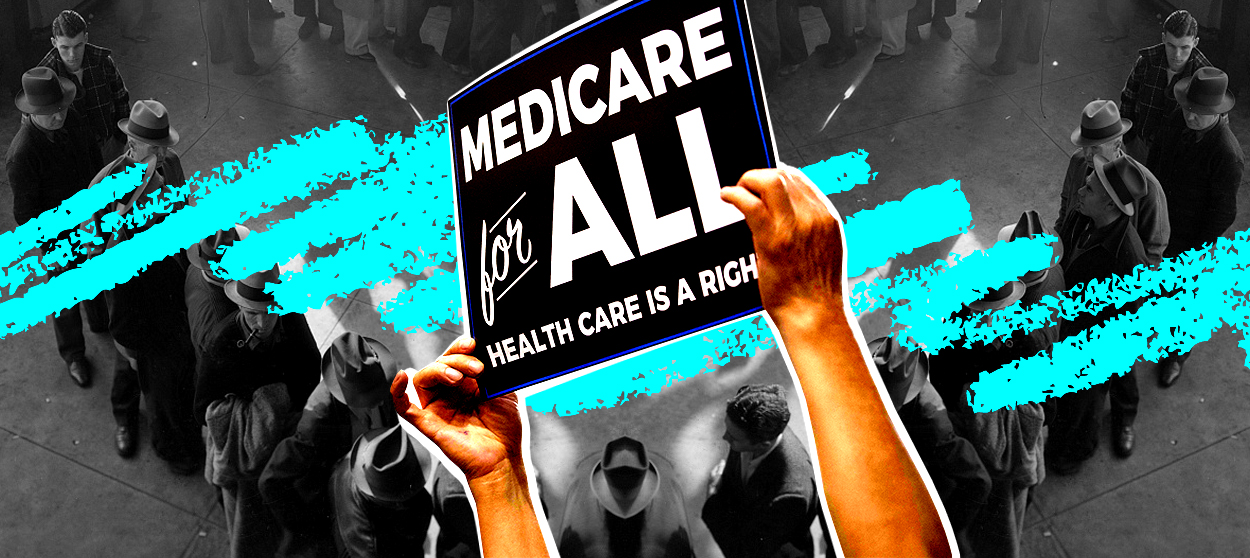2020 Democrats haven't been asked the hardest question on Medicare-for-all
Forget taxes. Someone needs to ask them about job losses.


A free daily email with the biggest news stories of the day – and the best features from TheWeek.com
You are now subscribed
Your newsletter sign-up was successful
Medicare-for-all has been the dominant issue of the Democratic presidential primary debates. So far, the battle over whether to expand Medicare to cover every American has largely been waged around two questions: 1. Whether Americans would still be allowed to purchase private health insurance, and 2. Whether Senator Elizabeth Warren will be goaded into filming her own Republican attack ad by agreeing that Medicare-for-all will be funded in part by new middle-class taxes.
But there's another, potentially more vexing consequence of Medicare-for-all that has been largely ignored by moderators, as well as the 2020 contenders: the plan's expected effect of eliminating some two million blue-collar and middle-class jobs in the United States.
Medicare-for-all promises to deliver a simpler, more humane health-care system. Inefficient and redundant bureaucracy would be eliminated. The immiserating time-suck of navigating network restrictions and doing battle with insurance companies would become a thing of the past. The globally outlandish sums the United States spends not on health-care services themselves but on wasteful administration would be redirected to more socially useful ends.
The Week
Escape your echo chamber. Get the facts behind the news, plus analysis from multiple perspectives.

Sign up for The Week's Free Newsletters
From our morning news briefing to a weekly Good News Newsletter, get the best of The Week delivered directly to your inbox.
From our morning news briefing to a weekly Good News Newsletter, get the best of The Week delivered directly to your inbox.
That would be sweet relief in countless ways. But Medicare-for-all's promise is a double-edged sword. The flip side is that reducing bureaucracy and administration means eliminating the jobs of bureaucrats and administrators. As University of Massachusetts-Amherst economist Robert Pollin put it, "Every proponent of Medicare-for-all — including myself — has to recognize that the biggest source of cost saving is layoffs."
Needless to say, the vast majority of those left jobless by Medicare-for-all would not be insurance CEOs. In a 2018 analysis, Pollin and his colleagues at UMass's Political Economy Research Institute found that Medicare-for-all would eliminate more than 1 million jobs for medical assistants, billing clerks, and other administrative support staff. The median wage for these workers is around $34,500. Nearly 92 percent of these jobs are held by women, and over a third are held by people of color. And over 80 percent of these workers have less than a four year degree. Indeed, medical assistant work has been the rare fast-growing career opportunity open to those without a college degree.
That impact of Medicare-for-all is especially uncomfortable for the plan's advocates: the workforce affected by these layoffs are the very people meant to be the base of their working-class movement.
Moreover, the elimination of the private insurance industry under Medicare-for-all would in turn eliminate more than 800,000 jobs in that industry. At least half of these are middle-class and blue-collar jobs like insurance agents, secretaries, and customer service specialists, with a median wage around $54,000. A third of these workers are over 50 years old — a notoriously hard stage in one's career to transition to a new line of work.
A free daily email with the biggest news stories of the day – and the best features from TheWeek.com
Some health care workers may find new opportunities under Medicare-for-all as nurses, home health aides, and other in-demand roles. But other workers will be displaced. While the immediate impact would be felt by health insurance and health-care administration employees, job losses could reverberate into hospitals, other providers, and ultimately into the broader economy — especially in communities that depend on health care as a major economic engine.
Medicare-for-all proponents are aware of this. The bills introduced by Sen. Bernie Sanders (I-Vt.) and Rep. Pramila Jayapal (D-Wash.) each set aside transitional funding for wage replacement and job retraining for workers who lose their jobs under the health care overhaul. But is this good enough? We've provided similar adjustment assistance to compensate those who lost jobs in the transition to a free trade system. But that has hardly seemed to quell the discontent by those who have borne the concentrated costs of globalization.
Today Medicare-for-all is being debated in a low-unemployment economy. But that could always change. There is a very real chance the economy could tip into a recession within the next few years, and the manufacturing industry is already in one. That could happen even before November 2020, in which case policy-inflicted job losses could suddenly become a political lightning rod for a Democratic presidential nominee tethered to Medicare-for-all. And even without an economic downturn, President Trump will undoubtedly use the plan's projected employment effects to paint his Democratic opponent as a job-killer.
Our health-care system shouldn't double as a jobs program. But decades of letting our broken system fester have turned it into one. It's precisely because health care in America has grown so bloated and entrenched for so long that such prudence is required to transition toward a more sensible and humane way of paying for care. For instance, one possible path forward could be to use private insurance companies and their employees to administer Medicare-for-all as a sort of "back room for government."
Medicare-for-all very well may be worth doing despite its employment side effects. But it's a debate that Democratic voters deserve to hear discussed — at least as much as the umpteenth attempt to get Senator Warren to say the "t-word."
Want more essential commentary and analysis like this delivered straight to your inbox? Sign up for The Week's "Today's best articles" newsletter here.
Joel Dodge writes about politics, law, and domestic policy for The Week and at his blog. He is a member of the Boston University School of Law's class of 2014.
-
 How the FCC’s ‘equal time’ rule works
How the FCC’s ‘equal time’ rule worksIn the Spotlight The law is at the heart of the Colbert-CBS conflict
-
 What is the endgame in the DHS shutdown?
What is the endgame in the DHS shutdown?Today’s Big Question Democrats want to rein in ICE’s immigration crackdown
-
 ‘Poor time management isn’t just an inconvenience’
‘Poor time management isn’t just an inconvenience’Instant Opinion Opinion, comment and editorials of the day
-
 The billionaires’ wealth tax: a catastrophe for California?
The billionaires’ wealth tax: a catastrophe for California?Talking Point Peter Thiel and Larry Page preparing to change state residency
-
 Bari Weiss’ ‘60 Minutes’ scandal is about more than one report
Bari Weiss’ ‘60 Minutes’ scandal is about more than one reportIN THE SPOTLIGHT By blocking an approved segment on a controversial prison holding US deportees in El Salvador, the editor-in-chief of CBS News has become the main story
-
 Has Zohran Mamdani shown the Democrats how to win again?
Has Zohran Mamdani shown the Democrats how to win again?Today’s Big Question New York City mayoral election touted as victory for left-wing populists but moderate centrist wins elsewhere present more complex path for Democratic Party
-
 Millions turn out for anti-Trump ‘No Kings’ rallies
Millions turn out for anti-Trump ‘No Kings’ ralliesSpeed Read An estimated 7 million people participated, 2 million more than at the first ‘No Kings’ protest in June
-
 Ghislaine Maxwell: angling for a Trump pardon
Ghislaine Maxwell: angling for a Trump pardonTalking Point Convicted sex trafficker's testimony could shed new light on president's links to Jeffrey Epstein
-
 The last words and final moments of 40 presidents
The last words and final moments of 40 presidentsThe Explainer Some are eloquent quotes worthy of the holders of the highest office in the nation, and others... aren't
-
 The JFK files: the truth at last?
The JFK files: the truth at last?In The Spotlight More than 64,000 previously classified documents relating the 1963 assassination of John F. Kennedy have been released by the Trump administration
-
 'Seriously, not literally': how should the world take Donald Trump?
'Seriously, not literally': how should the world take Donald Trump?Today's big question White House rhetoric and reality look likely to become increasingly blurred
